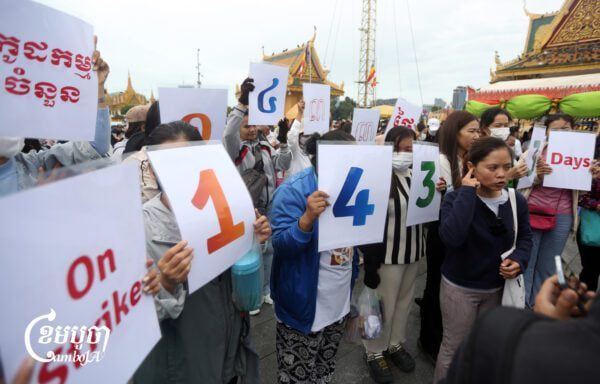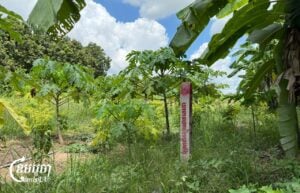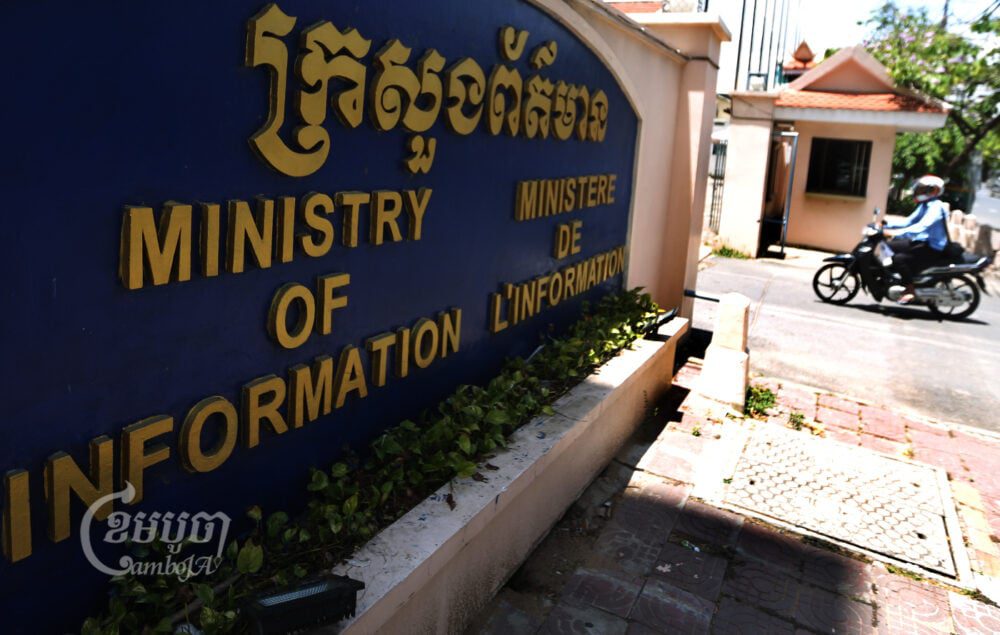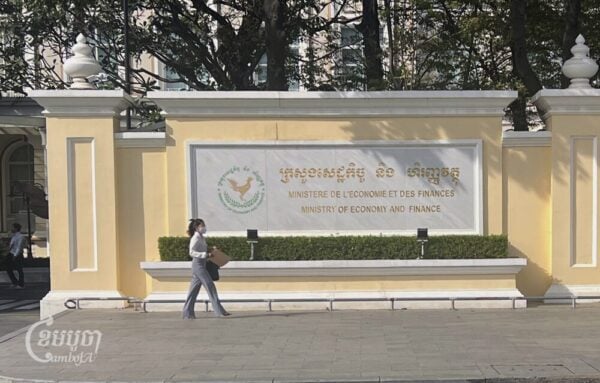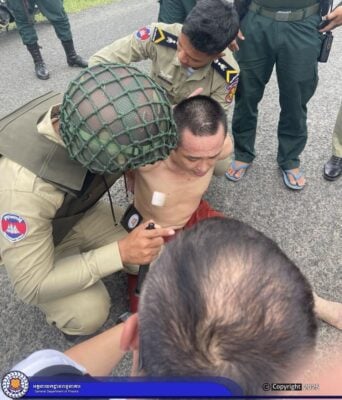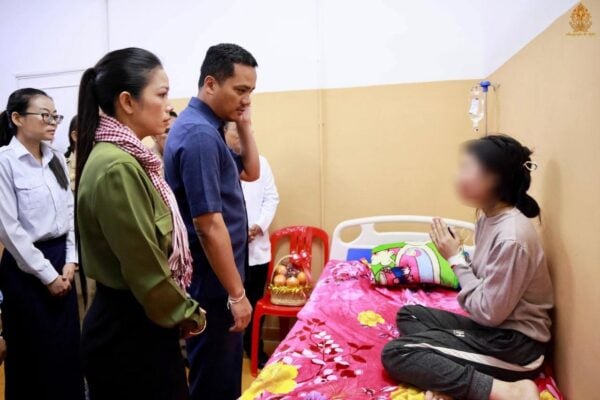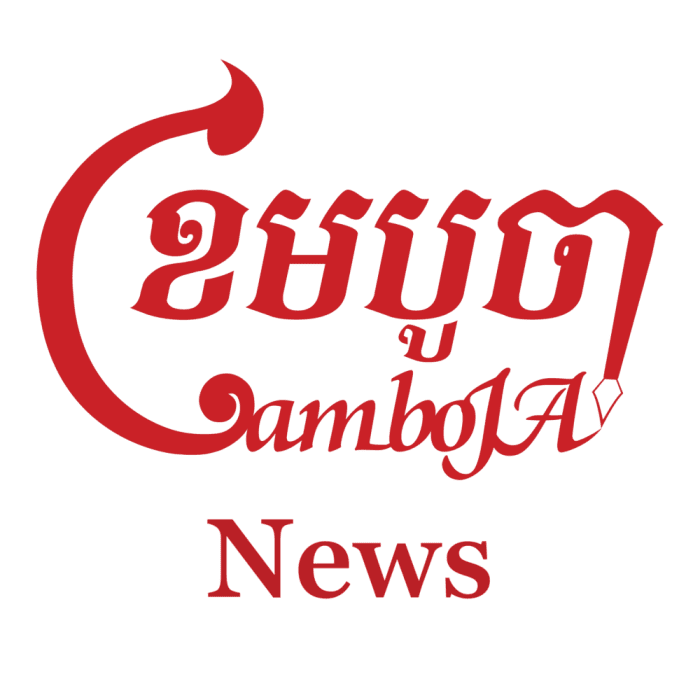The Ministry of Information has revoked the license of Sara NCC Daily after it published reports of Cambodian-Thai border tensions, calling them false information which threatened national security.
The ministry on August 21 said Sara NCC Daily, which also operates an advertising website called www.cen-daily.com, interviewed border residents about the conflict. The website has not been accessible since the cancellation.
On August 20, Meas Sara, a reporter for the NCC Daily Online website, interviewed a citizen about the situation of Cambodian homes seized by the Thai army and the military patrol posts at the border crossing.
Ministry spokesperson Tep Asnarith told CamboJA News that several journalists had violated the journalism code of conduct amid Cambodia’s serious crisis with Thailand, and had accepted the ministry’s guidance. He said because the issue is related to national security, journalists need to provide accurate information, with clear sources and verification before publishing.
“The ministry invited journalists, who had previously committed misconduct, to come in for guidance and resumed reporting in a professional manner. This latest case is a serious violation of the code of ethics, resulting in the revocation of their license,” Asnarith said.
He added that during the border dispute, the ministry carefully recorded and monitored the dissemination of information, and found 90 cases of false information and incitement, which could harm the King and both countries‘ governments.
“Other violations must be investigated under the framework of relevant laws, which fall under respective ministries and institutions,” he said.
Meanwhile, Meas Sara believes that the revocation due to his reporting may have affected the leadership or impacted other issues. He said, although the decision is a prerogative of the ministry, it has made it difficult for him as he wants to continue working in the field. He hopes that the ministry will forgive him and restore his license.
Sara said the ministry invited him to the office where he was given advice on the ethics of border dispute reporting as the information would benefit the nation.
In a Facebook live stream, he said he began working in the media in 2020, and the “most painful moment” in his career was the revocation of the company license due to his report. He said he would no longer work as a journalist, but would continue covering issues as a citizen because of his love for the country.
Sara said the ministry’s action against him was “unacceptable”, as he accepted their advice and guidance, claiming that everyone makes mistakes. He appealed to the public to look after his family, including his wife and children, in case he is arrested.
“I wrote the truth to everyone, but I received an unacceptable result. I apologize to the government. Please, Samdech Techo and Samdech Thip Dei, have mercy on me. I never thought I would reach this level. If I had stayed at home and looked after my family, it would have been better,” Sara said.
The revocation saw social media users engage in active discussion following Sara’s post on Facebook. Many users opined that the ministry should educate and guide journalists, not punish them at a time when the country needs a voice to disseminate information to the public.
Am Sam Ath, operations director for Cambodian human rights organization Licadho, felt the ministry’s decision was “too hasty”. They should have reviewed the media law and collected information comprehensively before making a decision, he said.
“Deciding to revoke the license too quickly may result in criticism because there are not many who dare to report on sensitive and challenging issues. The international community has also criticized Cambodia for the decline in press freedom, as only a few independent media outlets remain,” Sam Ath said.
Nop Vy, executive director of the Cambodian Journalists Alliance Association (CamboJA), said interviewing sources for news demonstrates professional practice, but he did not condone reporters exaggerating statements and opinions.
However, journalists should verify information by finding other sources, which is what they should do. However, in this case, Vy said, the decision should not have resulted in the withdrawal of licenses, because journalists who commit professional misconduct should be let off with “only a warning” or advice to do their job properly.
“Imposing a penalty [license revocation] is a serious action. I think the ministry should consider an alternative punishment. Otherwise, it will give rise to complaints of restrictions and oppression in the journalism sector. It may have a negative impact, especially since we are trying to show the international press that Cambodia is a place where various news reporting can be done,” Vy said.
In January this year, two online journalists, Duong Akhara and Lay Socheat, were charged with incitement under Article 205 of the Criminal Code after posting “controversial content”.
Recently, due to the border conflict, the Kandal Provincial Court said on Saturday that tycoon Chheng Sreyrath, a well-known internet vendor known as Love Riya, was charged with “inciting discrimination” and “demoralizing the army.”
Recall that Eam Ravuth, district deputy chairperson of the Nation Power Party, in Phnom Penh, was transferred to Correctional Center 1 (CC1) prison on August 18, 2025, after the Phnom Penh Municipal Court charged him with “insulting the King”.
According to LICADHO, the arrest was made following an expression and information he shared on social media. He could face up to five years in prison if convicted.
The media landscape in Cambodia continues to deteriorate as journalists face increasing threats, legal persecution, and violence for carrying out their work. In 2024, CamboJA documented 41 cases of harassment against at least 64 journalists, highlighting an intensifying crackdown on press freedom.
The most common form of harassment was legal intimidation, with 28 recorded incidents, including arrests, lawsuits, charges, detentions, and media license revocations. At least five journalists were placed in pretrial detention or sentenced simply for performing their duties.
Physical violence against journalists also persisted, with six cases involving threats, assaults on equipment, and personal attacks—including the tragic killing of journalist Chhoeung Chheng in Siem Reap province. Journalists also faced seven cases of intimidation and discrimination, deliberately creating their working conditions unsafe and unwelcoming.



